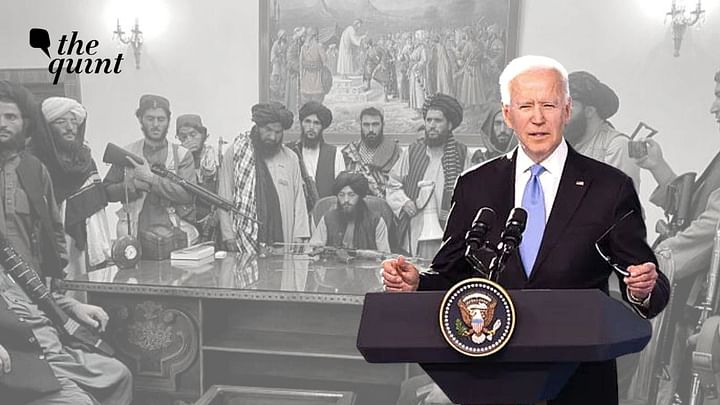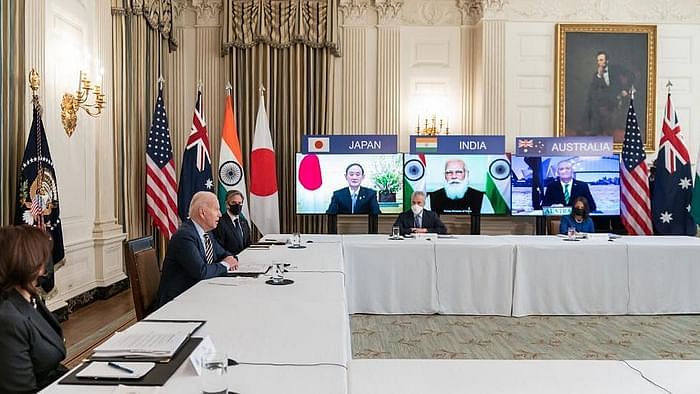On the face of it, there should be little or no impact of the events in Afghanistan on the Quadrilateral Grouping (Quad) comprising of the US, Japan, India, and Australia. According to the summit statement issued on 12 March, the outfit may share a common vision for a “free and open Indo-Pacific” , but it is about quadrilateral cooperation in a range of areas like tackling COVID, mitigating climate change, dealing with cyber security and critical technologies, counter-terrorism, quality infrastructure development and so on.
But those are only the declared goals of the Quad. Everyone knows that its real aim is to push back at China in the Indo-Pacific region.
And there, the question of the impact of the developments in Afghanistan on the Quad is legitimate. Many views have been put forward, some suggesting that the developments will enable the US to now focus on China and the Indo-Pacific, others argue that Taiwan could become more vulnerable.
India's Military Perspective Differs From US Outlook
The very fact that the Quad has chosen not to clearly articulate a common military outlook is a weakness in itself. That means that its four constituents do not share a common perspective here. Two of them—Australia and Japan—are linked through bilateral security ties with the US, and Uncle Sam is their ultimate security guarantor.
India stands out as an independent nuclear weapons power with a substantial military that does not need the US to defend itself. Further, while it may share a maritime perspective relating to the freedom of navigation of the seas, its security also has an important continental dimension where developments in Afghanistan, Iran, Pakistan and Central Asia matter. And often India’s perspectives are at variance with the outlook of the US.
Just how things stand is obvious if you read the press releases of the United States and India following the most recent consultations of the senior officials’ of the Quad. While the US one leads off saying “senior officials discussed the importance of peace and tranquility in the Taiwan Strait, ongoing crisis in Burma…” The Indian one does not mention Burma or Taiwan.
Afghanistan Debacle Affects US-Taiwan Relations the Most
Perhaps the biggest question-mark the US debacle in Afghanistan has left relates to the US and Taiwan. The Chinese media had taken to taunting the US with Hu Xijin, editor of the Global Times saying that with the fall of the Kabul regime “the Taiwan authorities must be trembling.” Senior Taiwanese officials, speaking on condition of anonymity, said that they could now not rely on the US, and President Tsai Ing-wen made it clear that the country would have to rely on its own strength and determination to defend itself.
Given the touchy question of the international status of the island republic, American policy was best characterised by the term “strategic ambiguity.” Three joint communiques (1972-1982) provide the US commitment to recognising the People’s Republic as the sole legal government of China and that there would be no political relations between the US and Taiwan.
These have been refined by the Taiwan Relations Act of 1979 wherein the US has recognised the “one-China” principle and defined the nature of relations with the “governing authorities of Taiwan.” The Act is silent on security guarantees against a Chinese attack, but it requires the US to provide arms to Taiwan to defend itself.
Big Question Mark on America's Credibility?
In a recent interview with ABC News Biden was prodded on the comments in the Chinese media that the Afghan situation showed that the US could not be relied on. In his response Biden declared that the US had iron-clad treaty commitments with South Korea, NATO and Japan to come to their defence, and then he also added Taiwan to the list.
Given the ongoing US-China tensions over Taiwan, this created consternation, but a Biden Administration official quickly calmed the situation by declaring that US “policy with regard to Taiwan has not changed,” and it was quietly let out that the President had “mis-spoken.” In fact Kurt Campbell, the Indo-Pacific policy coordinator of the Administration had earlier rejected the possibility of giving Taiwan an explicit security guarantee.
Subsequent to the President’s gaffe, US National Security Adviser Jake Sullivan clarified that US commitments to its allies and partners remained strong, but that “when it comes to Taiwan, it is a fundamentally different question in a different context (to Afghanistan).”
An anonymous official added that the mission of the US in Afghanistan was quite different from the commitment to maintaining peace and stability across the Taiwan Strait.
'

America's Tattered Will on Afghanistan May Not Automatically Mean the Same for Indo-Pacific
At the end of the day, all commitments and agreements are merely pieces of paper. What matters more is the sense of common interests in upholding them. As of now there is nothing to suggest that that has eroded in the case of the United States and its treaty allies and partners. What has happened is that some questionable American commitments made in the last twenty-odd years have come apart, for the simple reason that they were based on false premises.
But when it comes to, say, South Korea, Japan, Australia, NATO and even Taiwan, the US knows that their security and stability has a direct relationship to its homeland security and prosperity. They are linked not just through a piece of paper or some Congressional statement, but the nuts and bolts of trade and technology supply chains which, if disrupted, would damage the US as well.
America’s declassified Indo-Pacific Strategy put it across bluntly earlier this year that the principal US national security challenge was “how to maintain US strategic primacy in the Indo-Pacific region an promote a liberal economic order while preventing China from establishing new, illiberal spheres of influence.”
This is a goal to which all four Quad countries are aligned with and they all know that it depends crucially on not just American military and economic power, but US will. That may appear tattered and broken in relation to Afghanistan, but that need not automatically be the case for its Indo-Pacific policy.
Dangers Lies in China's Use of Afghanistan Policy Disaster
The instrument of that policy is the Quad, and there is nothing in the publicly outlined aims of the Quad that should be affected by the Afghan debacle. The Quad is being smart by adopting an unexceptional low-key approach that is based on the Biden’s view that the two countries need not have a conflict, but engage in “extreme competition.”
There is nothing in the Afghan experience can detract from the Quad’s commitments on vaccines, emerging technology cooperation and so on.
The Indo-Pacific policies, however, are an entirely different issue since various countries, including those in the Quad, have no agreed definition of the region itself, leave alone a common policy.
The real danger is not the taunts on Taiwan, but the manner in which Beijing will seek to use the Afghan policy disaster to put out the narrative of the American decline. This is a longer term and insidious project. And this is something that the US needs to answer not by displays of military power, but setting its own divided house in order back home.





No comments:
Post a Comment